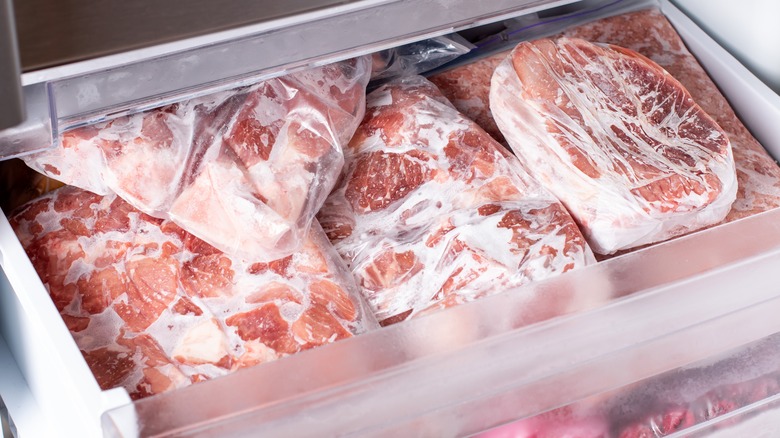You're Freezing Meat Wrong, But You Can Fix It In One Step According To Melissa Clark
Unless you eschew meat for personal reasons, animal protein most likely makes an appearance at your dinner table. There's certainly no shortage of great meat recipes to choose from. However, unless you're buying it fresh every day, you've no doubt had to store some in your freezer. Unfortunately, there is a right and wrong way to freeze your favorite cuts, and there's a good chance you're doing it all wrong.
In 2020, when stocking up on groceries was all the rage, Melissa Clark shared with "The Rachel Ray Show" her best tips and tricks for storing food in the freezer. First among them was rewrapping meat before freezing. It might be easy to store meat in its supermarket packaging, but this can lead to discoloration and freezer burn as the thin plastic is designed for easy access, not freezing. While not a food safety issue, freezer burn will cause the meat to become dried out and unappetizing.
Now, if you're already in the habit of rewrapping your meat, good on you. However, there's more to the process than just popping pork chops in a zip-top plastic freezer bag and calling it a day. Removing air, for example, is incredibly important as oxygen can change the taste of the meat and the way it looks.
How to freeze meat perfectly every time
Freezing meat is the best way to preserve its quality for an extended period of time. For the best results, Melissa Clark recommends removing your meat from its supermarket wrapper and placing it in an airtight bag. Using resealable plastic bags that are designed for freezing is essential, as thinner bags will invite freezer burn. Once you place the meat inside, you'll want to leave as little room as possible for water crystals to form. Using a vacuum sealer is ideal here, but if you don't have one, you can slowly immerse your bagged meat in water to push out the excess air and seal it when the water is nearly at the top.
Alternatively, you can use freezer paper to store your meat. When wrapping meat in freezer paper, you should place the meat on the wax-coated side to prevent moisture from leaking out and seal it with freezer tape.
When freezing your meat, write the date on it so you'll know when it was stored. The USDA recommends storing uncooked roasts, steaks, and chops for four to 12 months. However, the FDA has slightly different recommendations, stating that steaks can be stored for six to 12 months, roasts for four months to a year, and chops for four to six months. However, they both agree that ground meat should only be stored for three to four months before use. This is because it's more susceptible to freezer burn. One of the biggest signs of freezer burn is discoloration, such as brown or gray patches covering the meat, but with Clark's valuable storage tip you'll be set up for success.

